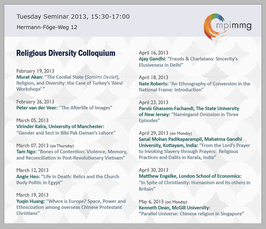"Spirits of the Citadel: Voice and Power in a Bangkok Community"
Religious Diversity Colloquium Spring/Summer 2013
- Date: Jun 10, 2013
- Time: 03:30 PM - 05:00 PM (Local Time Germany)
- Speaker: Michael Herzfeld (Harvard University)
- Michael Herzfeld is the Ernest E. Monrad Professor of the Social Sciences in the Department of Anthropology at Harvard University. Author of ten books, including most recently Evicted from Eternity: The Restructuring of Modern Rome (2009), and producer of two ethnographic films, he has conducted extensive research in Greece, Italy, and Thailand. His current research focuses on the impact of historic conservation on present-day communities, and especially the politics of eviction, and on the local impact of cryptocolonial and neoliberal dynamics. Recipient of numerous awards, including the J.I. Staley Prize (School of American Research) and the Rivers Memorial Medal (Royal Anthropological Institute, London), he has received honorary doctorates from the Université Libre de Bruxelles, the University of Macedonia (Thessaloniki), and the University of Crete, and is an Honorary Professor of Shandong University, Jinan, China. He has served (1995-98) as editor of American Ethnologist.
- Location: MPI-MMG, Hermann-Föge-Weg 12, Göttingen
- Room: Conference Room

For more details please contact vdvoffice(at)mmg.mpg.de.
The speaker will present his ethnographic research in a small community in Bangkok that has been resisting collective eviction for the past two decades and has in the process garnered considerable visibility for its cause. He will focus particularly on the ways in which this resistance to municipal authority is sustained in the face of overwhelming civic and national power, and will argue that in the battle over the community’s contested space – the historic site of Pom Mahakan – the leaders’ use of sound, including that of the amplified human voice, is part of a larger range of devices through which the community demarcates its space and maintains effective control over it. He will also argue that the community’s success to date has also depended heavily on its ability to exploit and reproduce the complex power relations (especially the play of egalitarianism and hierarchy) that characterize the modern Thai polity in general, and will show how that strategy is reflected in its use of sound and space. The lecture will be illustrated with slides.